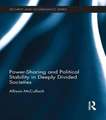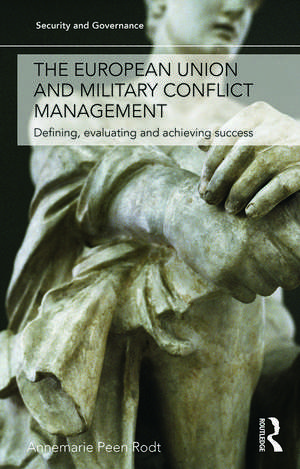The European Union and Military Conflict Management: Defining, evaluating and achieving success: Security and Governance
Autor Annemarie Peen Rodten Limba Engleză Hardback – 4 apr 2014
The EU has launched five military operations within the framework of its Common Security and Defence Policy with the explicit purpose to help manage violent conflicts beyond its borders. This book develops a definition and a set of criteria for success in military conflict management and applies this new analytical framework in a comparative case study of the five EU military operations undertaken in Macedonia, Bosnia and Herzegovina, the Democratic Republic of Congo, Chad and the Central African Republic. Having evaluated their success the book goes on to explore the conditions under which military conflict management operations conducted by international organizations are successful and explores the implications of its findings for the future theory and practice of military conflict management.
The European Union and Military Conflict Management will be of interest to students and scholars of security studies, conflict studies, European Union politics and foreign policy and global security governance.
Din seria Security and Governance
-
 Preț: 364.22 lei
Preț: 364.22 lei -
 Preț: 414.32 lei
Preț: 414.32 lei -
 Preț: 278.03 lei
Preț: 278.03 lei -
 Preț: 436.14 lei
Preț: 436.14 lei -
 Preț: 433.26 lei
Preț: 433.26 lei -
 Preț: 480.24 lei
Preț: 480.24 lei -
 Preț: 432.34 lei
Preț: 432.34 lei -
 Preț: 448.86 lei
Preț: 448.86 lei -
 Preț: 410.46 lei
Preț: 410.46 lei -
 Preț: 416.22 lei
Preț: 416.22 lei -
 Preț: 418.13 lei
Preț: 418.13 lei -
 Preț: 452.69 lei
Preț: 452.69 lei - 17%
 Preț: 259.72 lei
Preț: 259.72 lei -
 Preț: 362.05 lei
Preț: 362.05 lei -
 Preț: 452.31 lei
Preț: 452.31 lei -
 Preț: 483.49 lei
Preț: 483.49 lei -
 Preț: 408.54 lei
Preț: 408.54 lei
Preț: 1057.05 lei
Preț vechi: 1289.09 lei
-18% Nou
Puncte Express: 1586
Preț estimativ în valută:
202.26€ • 211.18$ • 167.40£
202.26€ • 211.18$ • 167.40£
Carte tipărită la comandă
Livrare economică 04-18 aprilie
Preluare comenzi: 021 569.72.76
Specificații
ISBN-13: 9780415714785
ISBN-10: 0415714788
Pagini: 192
Ilustrații: 6 black & white illustrations, 10 black & white tables, 6 black & white line drawings
Dimensiuni: 138 x 216 x 18 mm
Greutate: 0.52 kg
Ediția:New.
Editura: Taylor & Francis
Colecția Routledge
Seria Security and Governance
Locul publicării:Oxford, United Kingdom
ISBN-10: 0415714788
Pagini: 192
Ilustrații: 6 black & white illustrations, 10 black & white tables, 6 black & white line drawings
Dimensiuni: 138 x 216 x 18 mm
Greutate: 0.52 kg
Ediția:New.
Editura: Taylor & Francis
Colecția Routledge
Seria Security and Governance
Locul publicării:Oxford, United Kingdom
Public țintă
Postgraduate and UndergraduateCuprins
1. Introduction 2. Defining success in military conflict management 3. Conditions for success – a theoretical discussion 4. Internal success for the European Union 5. Limited success in managing violent conflict 6. Internal conditions for success 7. External conditions for success 8. Conclusion
Recenzii
This path-breaking new book proposes a robust scholarly definition of 'success' in EU military missions - and outlines precise criteria under which success might be predicted. Through a rigorous evaluation of internal and external context and appropriateness behind each mission, Peen Rodt offers the first real blueprint for a scientific assessment of CSDP's impact on the ground.
Professor Jolyon Howorth, Yale University
The European Union and Military Conflict Management critically assesses all of the EU’s military conflict management operations of the last decade to tackle one of the most hotly contested issues in the study of the EU’s international role. Peen Rodt expertly draws together a wealth of material that superbly combines comprehensiveness with analytical rigour to allow for a definitive evaluation of the EU’s role in global security governance.
Professor Richard G. Whitman, University of Kent
Although the book was certainly conceived for academic readers, members of the armed forces and practitioners, it could well be addressed to a general public: the methodological issues are presented in a very straightforward and concise way, illuminating the very narrow theme. Overall, the book strengthens a general awareness of EU military conflict management, and is bound to impact on future EU military operational experiences within the CSDP.
Aldo Liga, The International Spectator
Professor Jolyon Howorth, Yale University
The European Union and Military Conflict Management critically assesses all of the EU’s military conflict management operations of the last decade to tackle one of the most hotly contested issues in the study of the EU’s international role. Peen Rodt expertly draws together a wealth of material that superbly combines comprehensiveness with analytical rigour to allow for a definitive evaluation of the EU’s role in global security governance.
Professor Richard G. Whitman, University of Kent
Although the book was certainly conceived for academic readers, members of the armed forces and practitioners, it could well be addressed to a general public: the methodological issues are presented in a very straightforward and concise way, illuminating the very narrow theme. Overall, the book strengthens a general awareness of EU military conflict management, and is bound to impact on future EU military operational experiences within the CSDP.
Aldo Liga, The International Spectator
Descriere
This book provides a comprehensive review of the European Union’s role in military conflict management and makes an important contribution to debates on the EU’s role in global security governance. It features case studies on Macedonia, Bosnia and Herzegovina, the Democratic Republic of Congo, Chad and the Central African Republic.


















